Adapting the novel The Erl King by Michel Tournier, Volker Schlondorff (The Tin Drum) rethinks the Third Reich as a feast of glorious storybook paintings: misty plains and swamps with castles in the horizon, verdant forests out of Wagner’s Der Ring des Nibelungen, a Teutonic fantasy come to life. It’s a radical departure from the stately, architecturally grandiose images out of Triumph of the Will that we’ve come to expect, images so loaded with socio-political baggage they repel by their very association. By creating a new visual vocabulary and providing the perspective of a misfit child-man named Abel, played with mannered innocence by John Malkovich, The Ogre explores the allure of Nazi ideology through the eyes of a stunted, disconnected Peter Pan who discovers in it his Never Never Land.
The Ogre
directed by Volker Schlondorff
starring John Malkovich
opens April 9 at Grand Illusion
An orphan raised in a disciplinarian Catholic school, Abel wanders through life like a sleepwalker, barely able to meet the eyes of others. During the war, he’s captured by the Germans and sent to work at the magnificent hunting lodge of Hermann G�g (Volker Spengler). A handyman with the curiosity of child, Abel watches G�g’s grand entrance with a snarling lion on a leash with awe, and lurks around the edges of ceremonies and parties, his eyes jealous and excited, his mouth agape in wonder. Abel may be the lost bastard cousin of The Tin Drum‘s Oskar Matzerath, the adult in a child’s body. But where Oskar is repelled by the society created by the Third Reich, Abel is a lost soul uprooted from his social world of 1939 urban Paris and dropped into a woodland paradise, where the glory and grandeur of the Nazi mythology flourishes in a kind of timeless heartland, and where the Holocaust isn’t even a whispered rumor.
In some ways, all of this feels like a long prologue to the final act, where Abel becomes a servant in “The Castle,” a prep school and training facility for Hitler youth where he joyously cares for his charges like a big brother. Abel’s affinity for kids is recognized by the SS school leader, who sends him out to recruit children from the countryside. Clad in a dark cloak and pulling on two fierce bulldogs on leashes, he rides a black horse through the misty forests like a demon child-snatcher, the fantasy imagery twisted into gothic horror with a dreamy lilt. Abel, who has always been happiest as a servant (even as a boy he was a mere toady to his bully “best friend,” who expected Abel to wipe his ass), becomes the Igor to the Nazi Frankenstein.
The Ogre is seductively beautiful, from the high-contrast black-and-white sequences of childhood and capture by the Germans to the sparkling color of the hunting-lodge parties and the misty earth tones of the grand forests. In this stylized setting, Malkovich’s mannered performance is perfectly at home: with his pursed lips, puzzled eyes, and cocked head, he looks like a cross between a wide-eyed child and a bird. He’s the quintessential innocent seduced by the fantastic vision of a fairy tale come true, only to discover the nightmare beyond the dream. I’ve never seen a film make the Third Reich look so inviting, and ultimately that’s what is most troubling about Abel’s ordeal.







